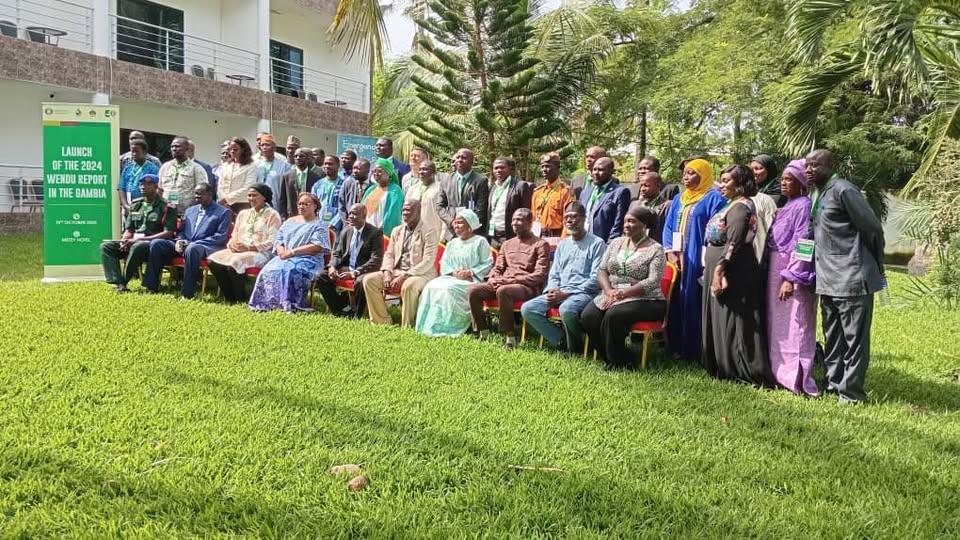Africa-Press – Gambia. The Economic Community of West African States (ECOWAS) Commission, in collaboration with The Gambia’s Drug Law Enforcement Agency (DLEAG), on Wednesday launched the fifth edition of the West Africa Epidemiology Network on Drug Use (WENDU) Report, a sweeping study that tracks drug use patterns and policy responses across the subregion.
The report, which covers ECOWAS member states and Mauritania, offers one of the most detailed assessments yet of drug use trends, emerging challenges, and treatment gaps in West Africa. It aims to provide policymakers with the data needed to strengthen both prevention and rehabilitation programs.
This latest edition zeroes in on treatment demand and access to services for individuals with substance use disorders (SUDs). While acknowledging that countries have made strides in expanding treatment options, the report notes that progress has been uneven. Persistent barriers—from limited trained personnel and weak health infrastructure to poor funding, data gaps, and governance shortcomings—continue to hinder access to quality care.
Representing the Minister of Interior, Deputy Permanent Secretary Abraham Mendy described The Gambia’s selection as host of the launch as a recognition of its “growing commitment to regional cooperation in combating drug trafficking and organized crime.”
He lauded ECOWAS for supporting the establishment of The Gambia’s first specialized drug rehabilitation center, calling it a “milestone” in the country’s evolving approach to drug treatment.
“The government of The Gambia has always committed itself to investing in young people in all spheres of life, particularly in education and health. Equally important to this government is the need to enhance youth resilience in the face of a dynamic and challenging world,” Mendy said.
He added that the launching of the WENDU 2024 report for the Gambia represents a critical milestone in their collective efforts to provide evidence-based approaches to addressing the menace posed by substance abuse disorders, especially among young people.
ECOWAS’s Director of Humanitarian and Social Affairs said the report’s findings should guide policymakers and partners toward data-driven solutions to drug prevention and control. “Reliable and current data are essential to designing effective interventions,” she said, urging stakeholders to align their programs with the report’s policy briefs and to identify priority areas for regional collaboration.
She reaffirmed ECOWAS’s commitment to helping member states tackle drug abuse and trafficking, noting that the Commission has already trained more than 200 professionals in 10 countries through the Universal Treatment Curriculum (UTC) and Universal Prevention Curriculum (UPC) programs. ECOWAS has also invested about $1 million in renovating and equipping rehabilitation centers across the region.
“The WENDU reports repeatedly identify the regional treatment gap. To address this challenge, the ECOWAS Commission has invested heavily in capacity building, training over 200 professionals across 10 Member States on the Universal Treatment Curriculum (UTC) and Universal Prevention Curriculum (UPC). The Commission has also financed the renovation and equipping of ten treatment and rehabilitation centers in our Member States, representing an investment of approximately USD 1million from the ECOWAS budget,” she stated.
For The Gambia, the launch represents both continuity and momentum. Demba Ceesay, Director General of DLEAG, said his agency has been part of the WENDU project since its inception in 2014. He described the collaboration as instrumental in shaping the country’s “balanced and integrated” approach to drug control — one that pairs supply suppression with demand reduction.
Mr. Ceesay called the completion of the new rehabilitation facility a “game-changer,” particularly under DLEAG’s Alternative to Incarceration (ATI) initiative. “The center will allow us to support first-time offenders and promote community-based interventions,” he said. “We want to view some drug-dependent individuals not merely as offenders, but as victims who need help to rebuild their lives.”
The WENDU Report has become an essential tool for tracking how West African nations confront the intertwined challenges of drug abuse, treatment access, and illicit trafficking. Its findings, officials said, will serve as a roadmap for deepening cooperation, improving treatment systems, and building more resilient communities across the region.
For More News And Analysis About Gambia Follow Africa-Press






